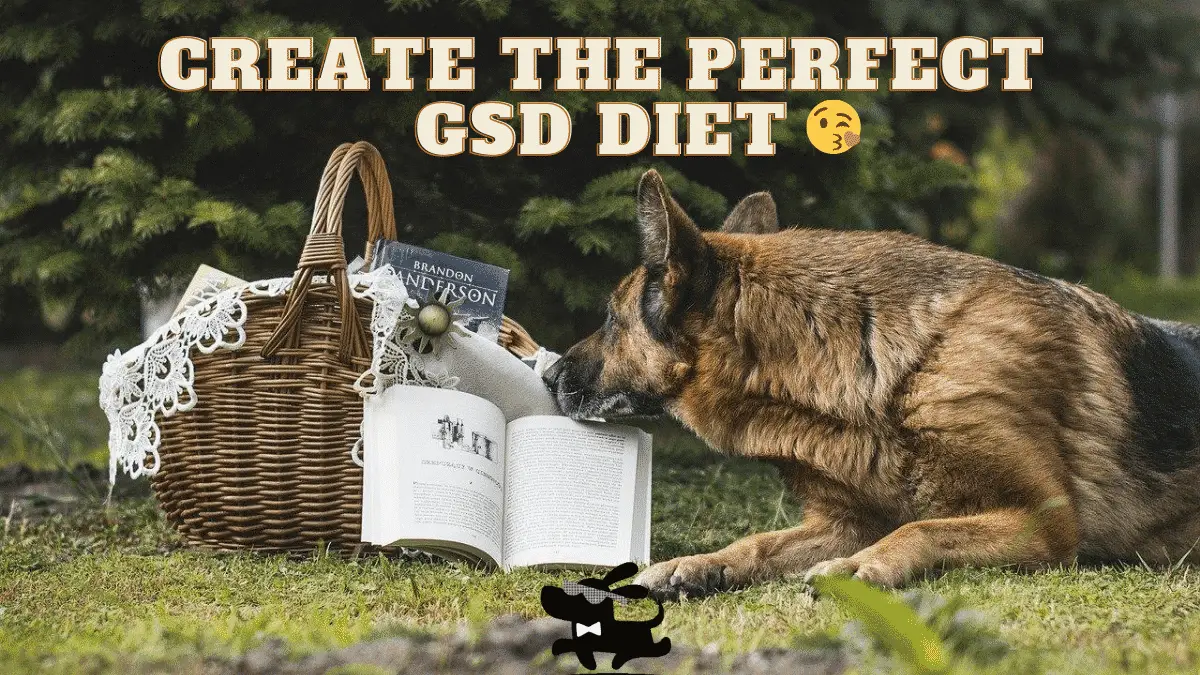German Shepherds are active, energetic dogs. They are one of the very few breeds that excel as both family dogs and as worker dogs. Your German Shepherd diet will play a big role in keeping them healthy and happy, so you really need to pay attention to it.
This makes a lot of new GSD owners ask; what is the best diet for German Shepherd Dogs? Well, the best diet for German shepherd dogs is one that’s rich in high quality proteins while also covering all the other nutrients. A diet that’s 18–22% protein, 8-12% fat content and has a 1/1 phosphorus to calcium ratio will be perfect for an adult german shepherd dog (18 months and older).
Table of Contents
German Shepherd Diet Guide
There is actually a lot to learn about your dog’s diet, and not only do dogs have different nutritional needs at every age, but also this can change from one dog to another depending on many things.
Things your dog’s diet depends on:
- Their physical activity level
- Their overall health
- Health issues they may have
- Food allergies
- Location and weather
So, yeah, there is actually a lot to learn about your dog’s food, but I promise you we will keep it as simple as possible.
What should be in your Dog’s Diet?
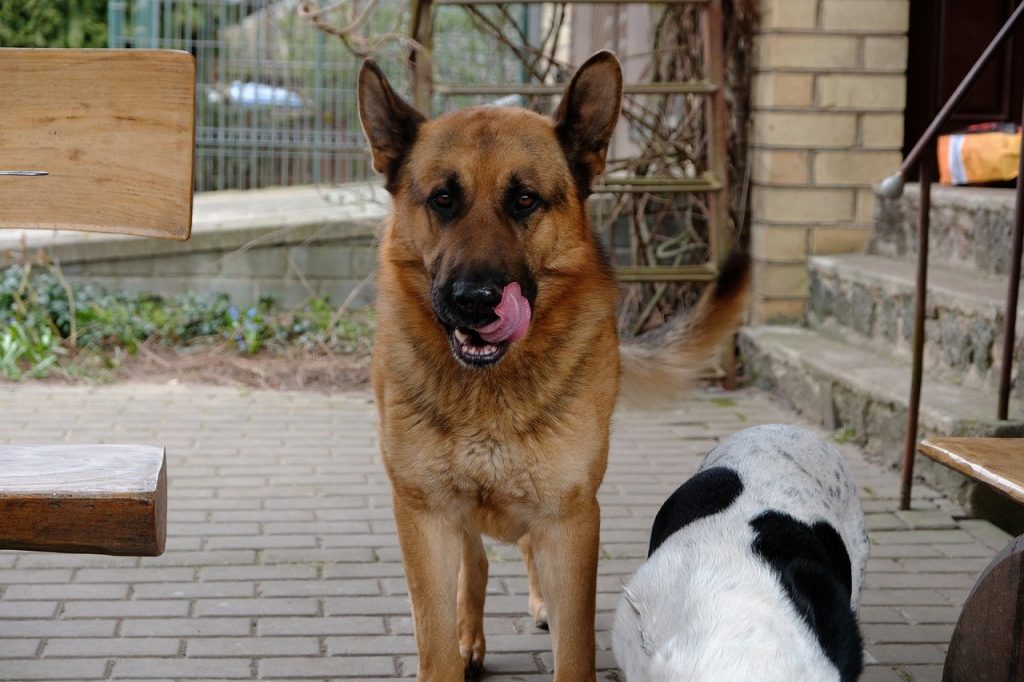
German Shepherds are carnivores by nature. They require a high amount of protein in their diet. This protein provides them with energy and keeps them strong and healthy. It is recommended that your German Shepherd gets about 22% of their needed protein in the diet.
They also require taking fat. Fat is burnt for energy and gives a taste to your dog’s meals. It’s recommended that an adult German Shepherd stays on diets that are 8-10% fats.
Fat also keeps your German Shepherd’s coat healthy. A German Shepherd sheds a lot throughout the year so it is important to give them the right amount of fat in their food.
As a rule of thumb, the more active your dog is, the more fats and proteins do they need. However, you still need to keep it limited because too much of a good thing turns it into a bad thing, and too much protein or fat intake is bad for your dog. For example, if you feed them a lot of fat, your German Shepherd will develop hip dyslexia.
Please keep in mind that in this article, I’m not going to discuss the topic of dry food, because It’s a topic that needs to go into in great depth. Fortunately, I have already done that in another article, so make sure to check out the best dog food for german shepherd puppies here.
How much to feed a German Shepherd per day
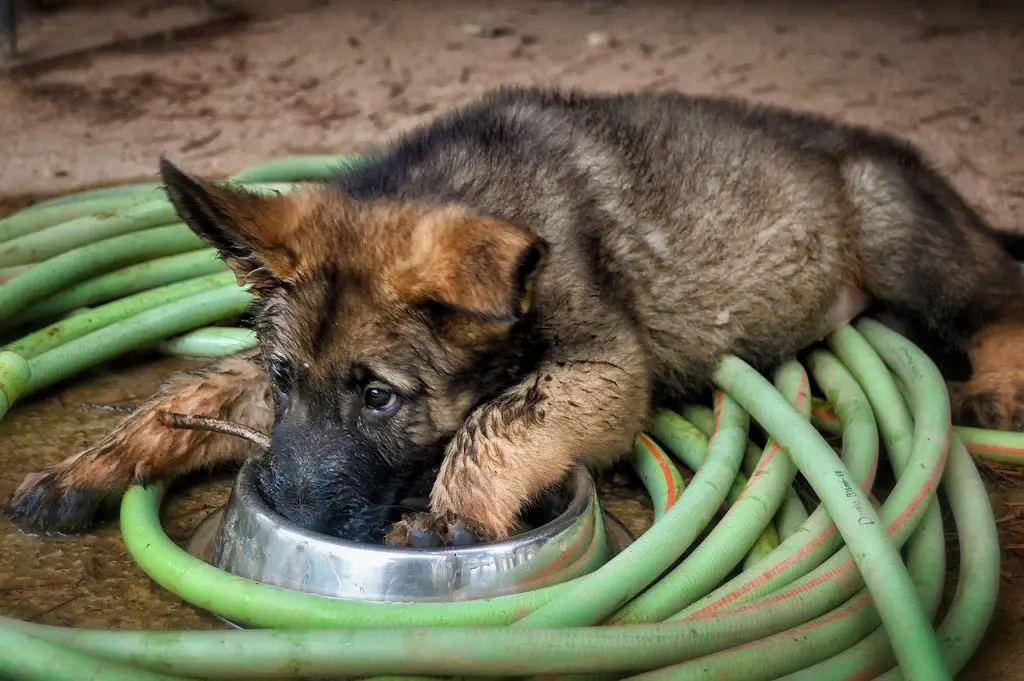
This, of course, changes completely depending on your german shepherd’s age. There are other factors that also affect a German Shepherd is their size and weight. Let’s get something out of the way first; for treats, they should only take about 10 % of your dog’s diet.
Now let’s see how much to feed your german shepherd in every life stage:
German Shepherd puppy
A puppy of 4.5 kg to 14 kg should be fed between 1-2 cups daily of food. German Shepherd puppies will need to eat three to four times a day throughout the day.
Adult German Shepherd
An adult German Shepherd is between 27 kg to 40 kg. They will need 3 to 5 cups of dog food daily.
Generally, you should feed an adult German Shepherd twice a day. One time during the morning and the other during the evening.
Senior German Shepherd
Consult your vet when your dog is about 6 to 7 years of age to discuss how much you should be feeding your German Shepherd. As your dog heads into their golden years, their needs will change and health issues will start to be more serious, so you’ll need to consult your vet and adjust their diets accordingly.
How many calories does a German Shepherd need daily?
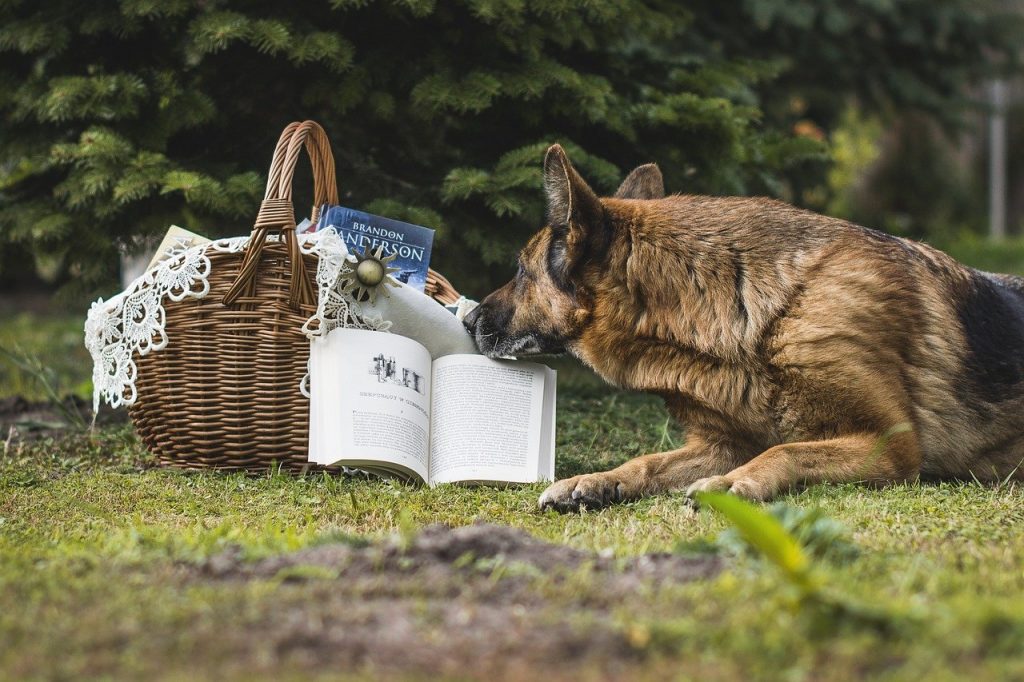
Both adult and senior German Shepherd dogs require 1,300 to 1,600 calories of food suitable for dogs. While active or working dogs require 1,700 to 2,400 calories. When fed an appropriate diet, a German Shepherd will grow to be between 60 to 90 pounds, and their diet should reflect their weight and nutritional needs.
Dogs of a large breed – such as German Shepherds – need a lot of food during their growth stages because they grow a lot and they grow a bit fast. About half of the calories these puppies will consume will be used for tissue growth and skeletal development, which is why their diets during the first 12-18 months must be balanced and why you need very close attention to the puppy food you feed your German shepherd.
Nutrients German Shepherds Need in their Diet
- Protein:
- Whole meat such as chicken, beef, fish, and lamb are meat sources. Protein can also come from meat meals concentrated meat in which moisture is removed. Vegetables also contain proteins to some extent, but dogs need meat and german shepherd shouldn’t survive on vegetables alone.
- Healthy Fat:
- Chicken fat, canola oil, and flaxseed are healthy sources of fats. The AAFCO recommends 8-9% fat for German Shepherd puppies and 5% for German Shepherd adults.
- Omega- 3 & 6:
- This is a fatty acid that helps keep a German Shepherd’s coat and skin healthy. DHA supports brain and eye development.
- Carbs:
- Dogs can actually survive without carbs, but a carbs-free diet is not recommended for german shepherds. Carbs are their fast-burning fuel, so your dog food should contain a good amount of healthy carbs. Carbs can be found in foods such as sweet potatoes and other white foods.
- Proper Calcium to Phosphorus ratio:
- Puppies should have a calcium to phosphorus ratio of about 1.2 parts calcium to 1 parts calcium. It’s important to not have a deficiency or excess in this ratio so your dog doesn’t suffer from problems such as bone spurs.
- Vitamins and minerals:
- These are important in your dog’s food diet. Vitamins and minerals are important for the dog’s immune system and keep your dog’s coat healthy.
- Water
- The best dog food for a german shepherd diet should contain good moisture content. A mix of wet food and dry dog food is important because dogs need to get some of their daily water intakes through their dog food.
What to avoid in commercial dog food?
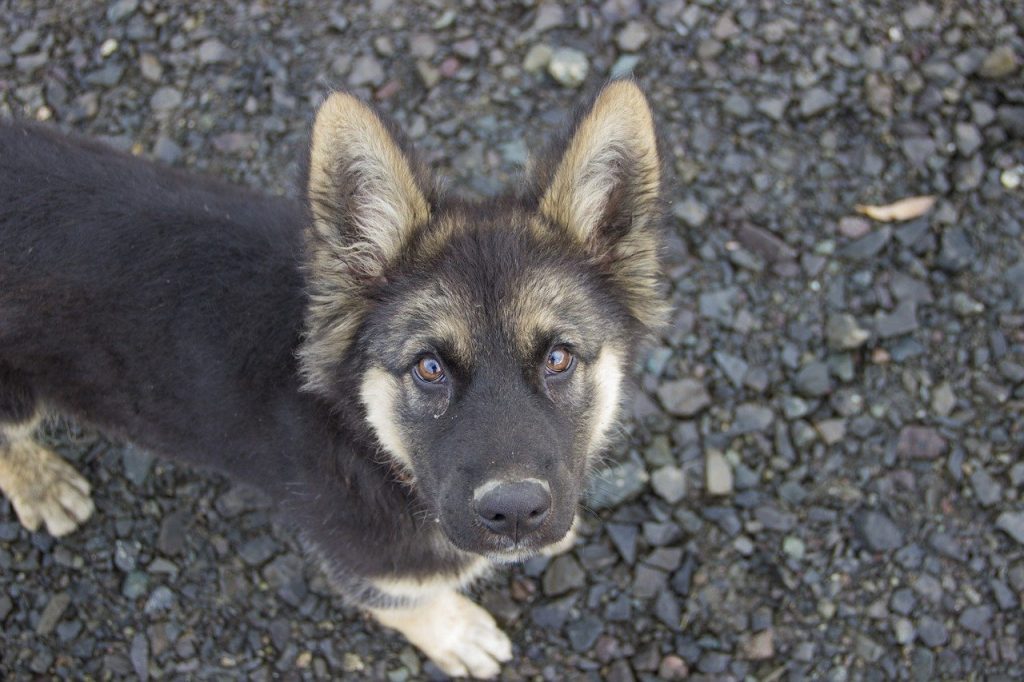
Whether it’s dry dog food or wet dog food, if it comes in a package, you need to read the label. The dog food for a german shepherd dog must have all the healthy nutrients but it also must be free from harmful chemicals.
Chemicals to avoid:
- Fat Preservatives (Ethoxyquin, BHT, BHA, propyl gallate)
- Sequestrants (tartaric acid, citric acid, and salts of potassium, sodium, and calcium)
- Texturizers (Sodium nitrate and nitrite)
- Mold retardants (Calcium propionate, sodium propionate, potassium salts, lactic acid, sorbic acid, and sodium diacetate)
- Moisturizers (Propylene glycol, calcium silicate, and sorbitol)
- Coloring dyes
Non-chemicals to avoid:
- Animal By-products
- Fillers (Corn syrup, wheat, soy, etc)
- Preservatives
When buying commercial dog food, If you see that the food contains any of the chemicals, avoid it. If the food contains other ingredients that you don’t know, it’s also better to just avoid it. Why would you feed your dog something that you don’t even know what it is?
Unfortunately, some manufacturers will add these bad ingredients even to their puppy food, so you need to be vigilant in what foods you feed your german shepherd puppy and always read the labels.
Dog owners should also keep checking on recalls to make sure the dry food or wet food you regularly feed your dog isn’t harming them.
If you found them on this list (of recalled dog foods), you should cut them off this food immediately and keep a close eye on them for any unusual signs or symptoms that may indicate serious health issues as a result.
7 Super Tips For A Perfect German Shepherd Diet
1) Follow a feeding schedule
You’ve got to follow a feeding schedule for your German Shepherd to prevent overeating (or undereating). They are more prone to overeating when they are not eating on a regular schedule. It also helps with training them and setting routines.
To make an eating schedule, start by feeding your dog five small meals a day and then slowly move o two to three larger meals a day.
Here are a couple of points to keep in your mind:
- A high active dog will require more food than an inactive dog. There are other factors to keep in mind such as age, size, metabolism, and health when deciding how much to give to your dog.
- A german shepherd puppy under 3 months should be fed whenever they are hungry so they can develop smoothly.
- If they are not eating properly or if you notice any sudden changes in their feeding habits, you should take them to the vet.
2) Give natural supplements that will reduce joint problems
German Shepherds are susceptible to bone and joints problems such as elbow and hip dysplasia, as well as osteoarthritis.
You can reduce the risk of these issues by keeping your dog in a healthy weight and exercising regularly. Giving them food filled with natural compounds such as chondroitin and glucosamine also helps.
These compounds will help reduce the loss of cartilage and will help with the making of new cartilage so as to keep the joints cushioned.
Also, there is Omega 3 which reduces joint inflammation and improves movement. It is found in salmon, flaxseeds, and fish oils which also have health benefits to their brain, heart, and coat.
3) Give them foods with probiotic supplements
German Shepherds are prone to digestive problems because they have a shorter colon than other dog breeds of their size.
Dogs will benefit from foods with probiotics. These probiotics contain beneficial bacteria which help your dog to digest their food and keep bacteria in check.
It’s also important to nourish these good bacteria so they can increase in number and be in their colon. To do so, give your dog probiotics and prebiotics, fiber-rich substances. This fiber will also slow down the passage of food helping your dog digest their food properly.
4) Consider their nutritional needs
Nearly 80 percent of your German Shepherd’s body is composed of bones and muscles. As a result, to build their healthy bodies, they will need a lot of protein and fats.
The amount of fat and protein depends on the size of the German Shepherd and their activity levels. A German Shepherd puppy, for example, will need less protein in total than their adult counterparts.
5) Track your dog’s activity levels
Naturally, German Shepherds are very active dogs and become less active as they age. As stated above, an active adult dog will need about 1,700 to 2,400 calories.
While another adult dog of the same size and age but who is less active can maintain their health and weight with less than 1,700 calories, for example, something that’s between 1,300 to 1,600 calories.
By tracking your German Shepherd’s activity level, you will know how much food they will need and can easily adjust it when you notice changes in their activity levels.
Keep in mind that their activity levels may also change as a result of a bad diet. A German shepherd diet that lacks all the nutrients they need can result in your dog becoming less active as they have less energy to spend, so you should keep this probability in mind, especially if you have soon changed their diet.
6) Look out for food allergies
If the whole world, one day, somehow, miraculously agreed on one food as the best food for a german shepherd dog, you shouldn’t include it in your dog’s diet if it causes them allergic reactions. And yes, dogs also have food allergies.
German Shepherds are commonly allergic to wheat and corn. Other foods that German Shepherds should avoid are preservatives, colorings, and chemicals as mentioned before in the article.
Some German Shepherd dogs are also allergic to dairy, white eggs, soy, beef, and chicken. These allergies can cause some reactions in your dog such as itchy skin, upset stomach, and diarrhea.
So what’s the solution? One of the solutions is buying food that is ” hypoallergenic” dog foods. This means that the meat has been hydrolyzed where the gut doesn’t recognize it as a foreign substance and so the food doesn’t cause any allergic reactions.
If you plan to feed your dog these specialized foods, you should know that they are some of the most expensive dog foods you can find, so don’t really go for them unless your dog really needs them.
If you don’t want to buy these diets, you can instead substitute the diet with protein sources that are less likely to cause allergic reactions in dogs like duck, tuna, and turkey.
7) Give them either raw food or cooked meals
If you don’t want to give your dog dry food, raw food is a great choice for German Shepherds. However, if your dog has allergies, you got to know from which type of protein do they have allergies from and switch the protein.
If you want to give your dog dry food, give them dry food with home-cooked food
How to feed your german shepherd to make them gain weight
If you notice that your dog weighs less than the average for their age group, you should take the matter seriously. Being overweight is often easier to treat than underweight.
So, what should you do if your german shepherd dog weighs less than normal?
Step one: Determine the cause
Take your German Shepherd to the vet to know what are the causes of them weighing less than the average for their age. It can be the result of two things either you are not feeding your dog enough food or perhaps you are not giving them the right kinds of foods.
They may have a disease, infection, or injury that is causing the weight loss. Some illnesses cause loss of appetite and lead to weight loss. If you notice your dog leaving food on their bowl after their meals and you are sure that they like the food, then it’s a sign of trouble.
Step two: Start a routine of weekly “weigh-ins”
Make sure to weigh your dog weekly so you know if your dog is gaining weight, losing weight, or staying the same weight.
This will help measure their weight so you can change their diet accordingly. If your dog continues losing weight even though they are eating more, you should take them to the vet.
Some dog owners do that when their dog is just a puppy and keep the routine consistent for the first 18 months or so of the life of the puppy but then stop when their dogs become grown-up, assuming that adult dogs stay the same weight. That’s as untrue for dogs as it is for humans.
Step three: Feed them several times throughout the day
You should give them dog food four or five times per day instead of giving them just two or three meals. Some dog owners leave dry food all day long and combine with it wet food once or twice a day.
I’m sorry, but having a large bowl of dog food laying there all-day is a sign of a lazy dog owner.
Even if you use the best dry food or wet food available, dog owners should not do that PERIOD.
The right thing to do is to provide meals throughout the day. Five or six small meals of delicious high quality dog food can help your dog gain weight quickly. And don’t forget about the treats.
Step four: Offer them human food along with their meals
You can offer your German Shepherd dog, along with their meals and as treats, human food such as vegetables like carrots and celery. You could also provide cooked chicken and turkey along their meals.
By doing so, you ensure that they get a variety of foods to eat from and get all the nutrition they need.
Step five: Keep a Regular Exercise Routine
It’s important to not only work on getting your German Shepherd gain weight without muscles. Thus , you need to build their muscles so they can have a strong and muscular body.
Some of the exercises that help make your German Shepherd gain muscles are walking, jogging, and swimming.
Top 10 Fruits and vegetable that your German Shepherd can eat
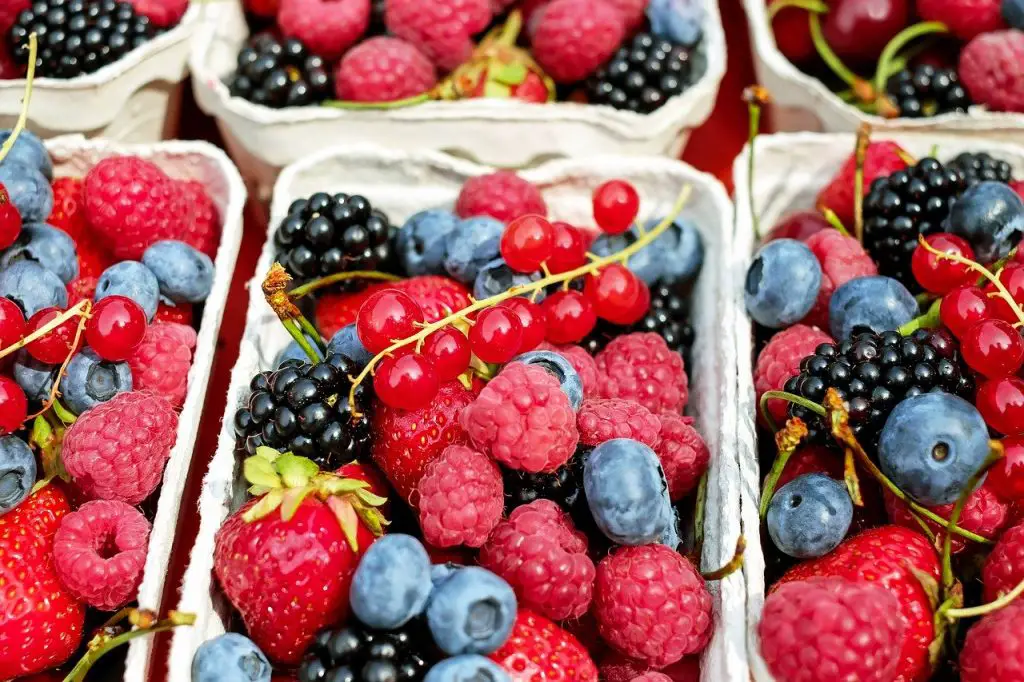
These are the 10 fruits and vegetables that are safe and nutritious for your dog. They are completely safe and should enrich their diet.
Fruits
1) Apples
One of the healthiest best foods for German Shepherds,when looking at fruits, are apples. Apples are low in protein, high in fiber, and antioxidants and benefit your dog.
Apples are also a good choice for senior dogs who have certain illnesses that require them to restrict their protein intake and be on a low-fat diet.
Apples are used as a substitute where they are easily digested and are low in protein and fat.
They are also good for younger dogs who need antioxidants and Vitamin C which will also help with problems such as joint disease.
2) Peaches
In small cuts, peaches are safe for dogs. They are a great source of vitamins and minerals like vitamin A and fiber. One important tip is to be careful to not give them the seed to prevent them from choking.
3) Pineapple
Pineapples should be eaten in moderation. They contain important minerals and vitamins such as vitamin C, B1, and B6, all of which are important in your dog food diet. They are also an important source of fiber, which is extra important if your dog is still a puppy in the developing stages.
4) Strawberries
Strawberries are a good source of fiber, vitamin C , and minerals. It benefits the German Shepherd’s body by slowing cellular aging and strengthening of the immune system.
5) Coconut
Coconut has many benefits to a German Shepherd. They provide many minerals and vitamins such as vitamin E. It decreases inflammation and helps boost the immune system.
Vegetables
6) Cucumber
Your German Shepherd can eat cucumber. The cucumber has many benefits such as it is a good source of fiber and water.
It also has antioxidants such as vitamin C, B vitamins, and potassium which reduces blood pressure.
7) Peas
Peas are healthy for your dog. They contain magnesium, vegetable protein, and vitamin B2. All of which benefit your dog.
8) Celery
It is one of the best vegetables for dogs. It contains vitamin A, B, and C and salts such as potassium, calcium, and phosphorus.
The best recommendation is to boil and cut it into pieces to give it as a treat or part of your dog’s meal.
9) Spinach
Spinach is important for your dog. They provide them with fiber, vitamins, and antioxidants. All of which are important for your dog’s health.
10) Lettuce
Lettuce benefits to dogs are 90 % water helping keeping your dog dehydrate.
Foods To Avoid
You should avoid the following foods at all costs.
- Avoid bad ingredients in dry foods like fillers such as corn syrup.
- It will also make your dog’s coat dull and flaky.
- Low-quality food will also make your dog weak.
- It will also not meet your German Shepherd nutrition requirements.
- Bad dog foods will make your German Shepherd’s lower belly fat.
- It will also create stomach problems for your German Shepherd.
- Avoid foods that contain harmful preservatives.
- It will also cause preservatives.
- Avoid dog foods that contain flavoring and coloring agents.
Meals for German Shepherd with weak digestive issues
This is an excellent meal for german shepherds with digestive issues. The recipe is very easy to follow and preparing the meal takes no time at all.
Ingredients for the meal
- 1 sweet potato
- 8 ounces chicken breasts
- Vitamin E capsule
- 1 cup rice
Cook the rice and potato each separately. Then, boil the chicken in a separate pot and cut into little pieces. Mix everything together.
Meaty meal for German Shepherds
You can serve them this recipe three times a day. This recipe contains the following:
- 1kg rice
- 300-gram beef
- 250-gram carrots
- 250-gram green veggies including parsley, celery, and parsnips.
- Very little salt for taste.
To make this recipe, you will need to boil the meat until it is tender. Then add vegetables and salt into the beef pot and let them cook into steam.
Prepare rice into another pot and add it to the beef pot when it is ready.
A meaty meal for German Shepherds
This meal is packed with proteins and fats that are important to your German Shepherd.
- 3 to 4 cups beef broth
- 1 teaspoon flaxseed oil
- 2 raw eggs
- 1 lb raw beef liver
- 1 cup cottage cheese
- 1 teaspoon cod liver oil
To make the recipe, first add raw beef liver, beef broth, flaxseed oil, and cod liver oil in a pot and cook. When it is almost finished, add the cheese and raw eggs and give it to your German Shepherd.
Conclusion
In conclusion, the best food for German Shepherd is one that offers them all the nutrition requirements that they need. There are important tips to help keep your dog healthy and not suffering from the effects of bad food.
Related Questions
What food can I give my German Shepherd to gain weight?
You should give them dog food that’s rich in protein and other nutrients. There are no magical best dog foods for german shepherds that you can give them to gain weight, and instead you have to create the perfect diet customized to your dog.
Dog owners can create the perfect food diet for their german shepherd by combining high quality wet food, dry food, with homemade dog food and make sure their pups can get their needed meals three or more times per day.
You should also keep in mind that a puppy will have different needs than an adult dog. This includes not only the nutrients in their food, but also things like the balance of wet food to dry food in their diets. A puppy may also need some dietary supplements along their food to gain weight if they can’t get the nutrients out of their meals as caused by some issues like certain medical conditions.
What can I give my German Shepherd for an upset Stomach?
If your dog has an upset stomach, I would steer away from commercial foods (both dry food and wet – even if they’re high quality) and instead give them a simple food that’s easy to digest like:
- Chicken and rice
- Bone broth
- Shredded chicken
- Baby food
- Pumpkin
If your dog, especially if they’re in their puppy years, refuses to eat at all and shows signs of distress, you should take them to the vet.
Sources
Fruits and Vegetables Dogs Can or Can’t Eat

